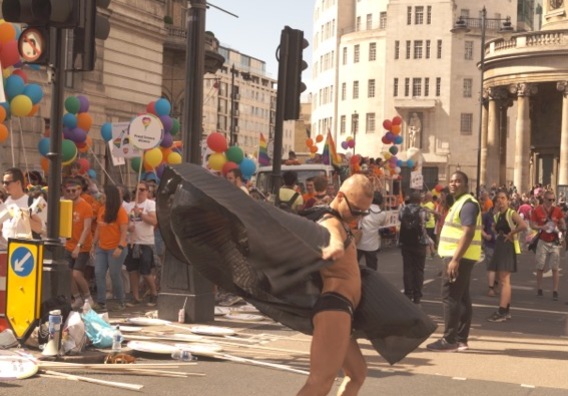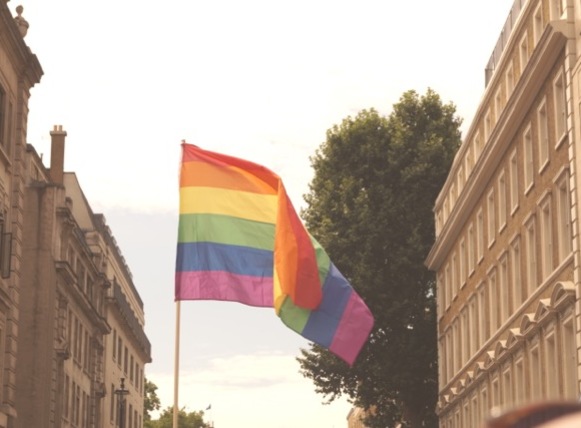Behind the rainbows: speaking to Aimee Challenor about mental health within the LGBTIQA+ community - By Lisa Woods
Posted on 19th July 2017 at 15:20

Aimee Challenor (far left) at the London Pride Parade 2017
Walking through Oxford Street, the space was flooded with colour. Red, orange, yellow, green, blue and purple covered the grey walls and buildings. A procession of flamboyant vehicles jived through the streets, booming out vibrant songs and encouraging the crowd to dance. It is undeniable that the energy on that day was full of nothing but positivity, happiness, and of course buckets of Pride. However, beneath the surface, there is a blackness. And when the crowds disperse and the people return home, the LGBTIQA+ community go on battling oppression, hate and mental health problems. This is not to say all of them go through this, but the figures show that LGBTIQA+ people are three times more likely to suffer depression, twice as likely to experience suicidal thoughts or make suicide attempts, and seven times more likely to take drugs, compared with their heterosexual counterparts.
At the front of the Green Party banner at London Pride 2017 was Aimee Challenor. She identifies as transgender and is heavily involved in activism within the LGBTIQA+ community. Her roles include representing the LGBTIQA+ community for the Green Party in England and Wales, and being a trustee of Coventry Pride. She spoke to us at Break Forth UK about mental health within the LGBTIQA+ community.
Why do so many people in the LGBTIQA+ community experience mental health problems?
I’d say it’s down to the discrimination, and abuse we face. It’s because of the anxiety of waiting until it’s right to come out, sometimes having to hold on years knowing but not able to say for fear of retaliation. It’s because of the societal pressures that are caused by a society where being Cisgender and Heterosexual are still seen as “the norm”.
What problems have you faced yourself?
I’ve spoken previously about the anxiety and depression I faced before coming out, and it still continues especially when there’s a lot of hateful abuse thrown at me, particularly online.


Do you think enough is being done to eliminate these problems?
No.
Whose job is it to eliminate these problems?
All of us. We can all help tackle homophobia, biphobia, and transphobia. We can all make sure that we are loud about being inclusive and accepting of LGBTIQA+ people. The NHS should improve its provision of Mental Health services, the Government needs to make the provisions for the NHS to do this by increasing the NHS budget and protecting the rights of NHS workers – no matter what country they may originate from. Schools and Colleges need to do more to tackle bullying and abuse. Social Media sites need to take action against hate speech. We can all improve.
This year marks 50 years since homosexuality was decriminalised. Where do you think we will be as a society in terms of views towards the LGBTIQA+ community in another 50 years time? Do you think the community will still struggle with mental health problems?
It’s genuinely hard to say, over the first half of the last 50 years, progress was slow, but then more recently we’ve been making great strides, but we must not be complacent. LGBTIQA+ people across the globe are facing state-sanctioned torture, abuse and murder. Donald Trump is repealing and removing protections for LGBTIQA+ people, and the UK Government is following suit by threatening to repeal the Human Rights Act. We must stand up and not only protect our rights but continue to advance them. Over the next fifty years, we could go so far by introducing legal recognition for non-binary people, ending unnecessary intersex surgery, equalising blood donation rules, and so much more, but we must work for it. Together we can overcome barriers and make great changes.

Lisa Woods is the Social Media and Communication Coordinator for BreakForth
Copyright © 2017 BreakForth
Share this post:


